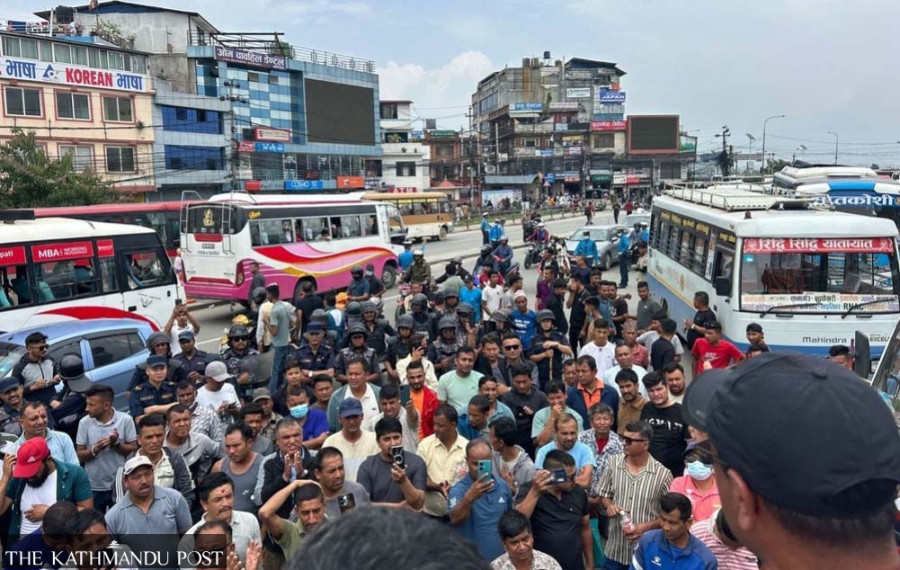National
Transport entrepreneurs protest against ride-sharing regulations in Kathmandu
Demanding scrapping of Gandaki Province’s new guidelines, transport operators warn of indefinite nationwide shutdown from June 2.
Bibek Pokhrel
Transport entrepreneurs enforced vehicular strike across Kathmandu’s Ring Road on Saturday in protest against the ride-sharing guidelines recently introduced by the Gandaki provincial government.
The protest, which lasted from 11:30am to 12:30pm, saw vehicles displaying black flags as vehicle operators voiced opposition to the rules that allow private red-plated vehicles to operate commercially.
Claiming that the provincial guidelines contradict the Motor Vehicles and Transport Management Act 1993, the Federation of Nepalese National Transport Entrepreneurs and allied associations have submitted a seven-point demand and launched a coordinated campaign.
“The guidelines are unconstitutional and threaten the existence of the public transport sector,” said Bhim Jwala Rai, chair of the Independent Transport Workers’ Association of Nepal. “Today’s protest is part of our announced programme after the government failed to heed our concerns.”
According to federation president Vijay Bahadur Swar, separate regulatory frameworks created by all seven provinces are undermining national transport laws. “The rules, especially Article 2(j) of Gandaki’s 2025 guidelines published on May 15, must be revoked immediately,” he said.
Swar argued that the move aims to boost the sales of red-plated vehicles stuck at customs warehouses under the guise of promoting digital innovation.
“There needs to be a clear distinction between personal and commercial use. Either the state allows us to operate public transport with red plates, or it must ban ride-sharing on them altogether,” he added.
The transport ministry in Gandaki, however, claimed that it consulted stakeholders before formulating the guidelines.
“Ride-sharing was in practice, but not recognised by law. Our decision is based on constitutional authority given to the provinces,” said Kamal Kumar Adhikari, secretary at the Ministry of Physical Infrastructure and Transport Management.
Rajiv Pokharel, director general at the Department of Transport Management, echoed the argument. “Licensing and regulatory responsibilities lie with the provinces. We only set national standards,” he said.
Beyond ride-sharing, transport entrepreneurs are also demanding that the Supreme Court’s April 2, 2024 order regarding the renewal of transport cooperatives under the Association Registration Act 1977 be implemented without delay.
They have also called for the swift execution of past agreements with the federal government, enforcement of vehicle load limits, mandatory social security contributions in public transport, and revision of insurance rates to support accident victims.
Additional demands include the formation of a powerful transport authority, stricter implementation of goods insurance under the Transport Act, and rectification of the policy allowing foreign cargo and passenger vehicles a 72-hour entry window without adequate customs checks.
The protest is jointly led by the National Federation of Nepal Transport Entrepreneurs, Public Transport Central Federation, Truck Transport Federation, Freight Transport Federation, and several workers’ unions.
The group plans to hold a mass demonstration at Maitighar Mandal in Kathmandu on Sunday. If their demands are not fulfilled, they have threatened to withdraw all vehicles from service nationwide starting June 2, suspending public transport indefinitely.
Transport operators warn that failing to resolve the issue could put Rs1.3 trillion worth of investment in jeopardy and affect the livelihoods of 1.5 million workers and 4 million dependent families.




 10.12°C Kathmandu
10.12°C Kathmandu















